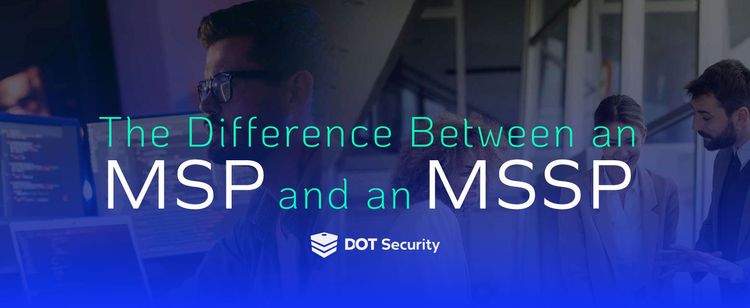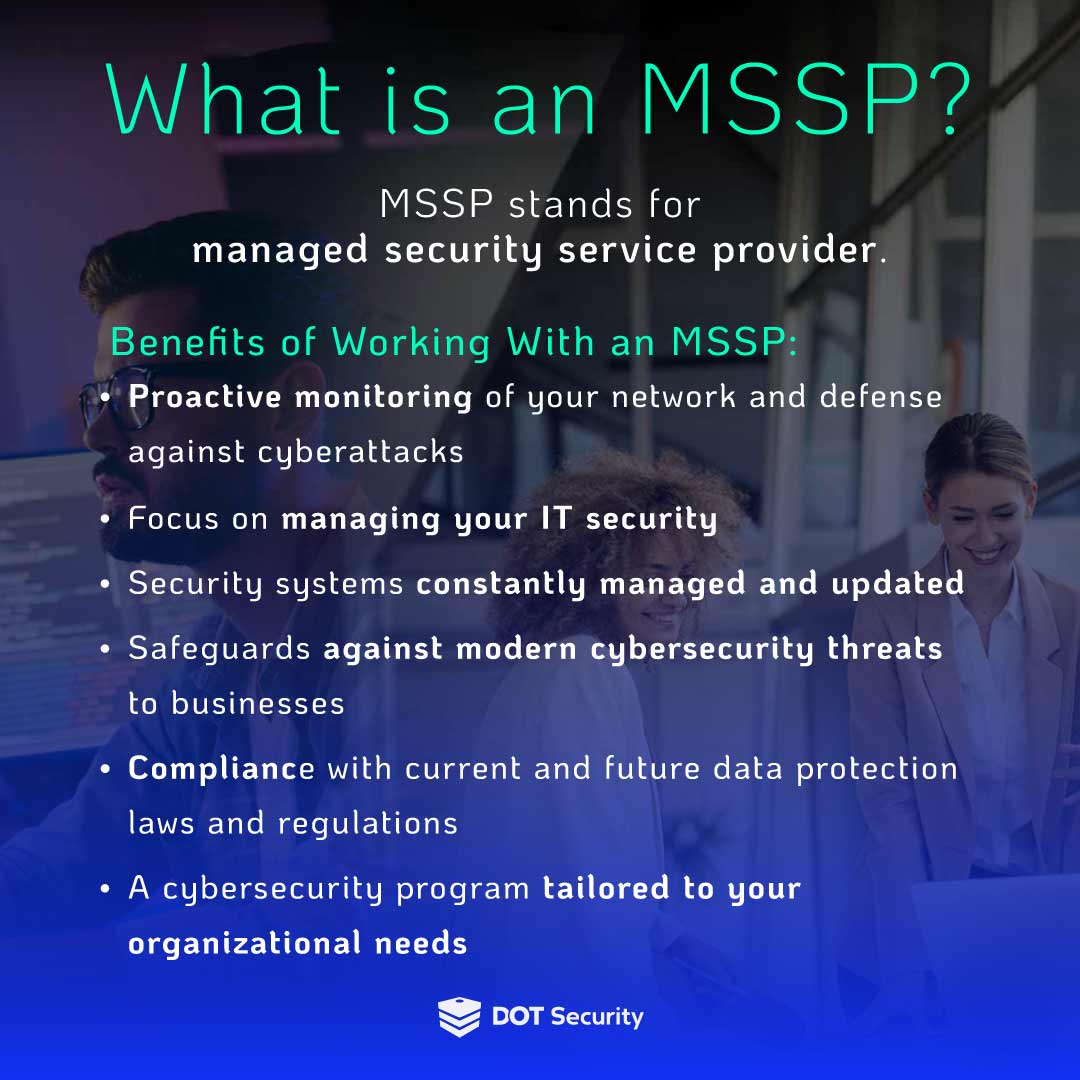Cybersecurity Consulting
The Difference Between an MSP and MSSP
January 03, 2023
5 Minutes

What is the difference between an MSP and an MSSP? The main distinction between these two is which area of a business they serve. Whether your business needs to implement new tech, develop a new marketing strategy, or create a cybersecurity program, this blog will show you which services each offers.
MSSPs are increasing in number and level of demand. In fact, the MSSP market size is expected to increase from an estimated $27.7 billion in 2022 to a sizeable $49.6 billion by 2027.
Read below to learn more about MSPs and MSSPs, and why they have become necessary for organizations.
If you’d first like to learn about DOT Security, an MSSP led by industry experts, check out our page Why DOT?
What is an MSSP?
MSSP stands for managed security service provider. An MSSP oversees the cybersecurity of its client companies, ensures their systems and endpoints are secure, and provides continuous monitoring of its network and cloud infrastructure.
Just like a robust home security system is made up of cameras, alarms, and a team of professionals proactively ensuring your home is safe, an MSSP creates a sturdy shield against cyberattacks and threats around your organization.
While cybersecurity was not a mainstay for most companies in the past, it is now an increasingly crucial aspect of conducting business.
In fact, the FBI received 847,376 complaints concerning cyberattacks and malicious cyber threats in 2021. This number increases yearly, especially due to the effects of the pandemic, which are still felt in the business world.

Benefits of Working with an MSSP
When an organization is aware of current cyber threats and requires assistance safeguarding its network, endpoints, and data, an MSSP can provide that protection.
Let’s go into depth on what the major benefits of working with an MSSP are. They include:
1. Access to Highly Trained Professionals
Since cyber threats are continuously evolving—malicious hackers are constantly developing new technology and social engineering techniques to trick users—having access to experts who understand these threats and how to prevent them is crucial to upholding the cybersecurity of your business.
A reliable MSSP should have a team of cybersecurity professionals who can work with your organization to assess its security challenges, technology requirements, and data compliance needs.
Additionally, consider the cybersecurity talent shortage increasing yearly, with more than 700 thousand unfilled positions in the US currently. For businesses, this means an MSSP can provide much needed cybersecurity professionals with a minimum level of hassle and cost.
2. A Reliable Security Operations Center (SOC)
A SOC, or security operations center, is a facility housing the experts and technology that monitor a business’ security 24/7.
The analysts, engineers, virtual Chief Information Security Officers (vCISOs), and compliance officers in a SOC work together to prevent threats against their client organizations and deter malicious actors from launching cyberattacks, all from a single, secured location.
In a SOC, experts can collaborate and use state-of-the-art technology to protect client organizations.
Watch a virtual tour of DOT Security’s SOC. See what cybersecurity experts do there and what technologies they have at their disposal in the video below:
3. Protection with the Latest Tech
After an MSSP performs a risk audit to find any gaps in your network environment and practices, it will assemble a tech stack that can efficiently safeguard your assets.
The technology you use should not impede any of your operations, but rather ensure they can be performed securely. The right MSSP can advise you as to which tech is the best for your needs, company size, and location of your employees.
Cybersecurity solutions often include next-gen antivirus, network detection and response solutions (NDR), endpoint security, app and web security, and advanced threat detection, among others.
4. Advice from Compliance Experts
As more customer and privacy data laws are developed or become more strict, businesses will be compelled to establish protocols to comply with regulations and maintain customer trust.
Understanding compliance controls and how they affect your business is a complex process. The regulations an organization should adhere to depend on the data it handles, the location of its customers, the sector it serves, and a number of other factors.
Therefore, with an MSSP, you can lean on a compliance manager to make sense of which requirements apply to you.
5. Continuous Monitoring of Your Network and Endpoints
Just like in the home security scenario above, it would not make sense for your provider to leave your home unguarded at certain times of day or for days at a time. Partnering with an MSSP is a reliable option for SMBs to receive continuous protection against threats.
With experts working to monitor your network environment, your systems, cloud infrastructure and endpoint would be proactively secured at all times.
If a threat is detected by a specialist, they can mitigate it or escalate the alert depending on the situation. This allows you to focus on operating your business with the reassurance of knowing that someone is shielding your network and data.
What is an MSP?
MSP stands for managed service provider. As the name suggests, an MSP will manage a number of services and solutions for the client company. These services can include IT, digital transformation, office printing environments, cybersecurity, and marketing and branding, among potential others.
A managed service provider’s main focus is managing the technology of your business. Whether your company is looking to implement new technology and software, solidify their current infrastructure, or revamp their marketing strategy with tech, an MSP can take care of those needs.
Typically, an MSP will conduct a thorough assessment of your internal IT and work processes—and other areas depending on your contract—to find out where technology would best benefit your company and how it can best serve you and your employees.
What Are the Benefits of an MSP?
Working with an MSP can bring a number of benefits for your business, including:
-
Cost reduction: In the long term, working with an MSP to digitally transform your business will result in more automated tasks, efficient operations, and less time spent on manual processes, all without having to onboard a huge team yourself.
-
Expert support: An MSP also has local in-house professionals with extensive experience and a number of certifications to help your business whenever minor snags or major problems appear.
-
Better employee satisfaction: When the right technologies are used, your employees will have less tedious tasks to manage, giving them more time for more creative and rewarding tasks.
-
A guided technology roadmap: Implementing new hardware and/or software in your business can be a challenge. An MSP offers the advice, technical knowledge, and support to do so in the correct and most efficient way.
Bottom Line
The main difference between an MSP and an MSSP is that MSP offers services related to technology which can affect different departments in your organization—such as IT, marketing, HR, etc. On the other hand, MSSPs deal strictly with the cybersecurity of a business.
MSSPs and MSPs work hand in hand. While an MSP can help you manage your IT infrastructure, marketing strategy, digital innovation strategies, and more, an MSSP would take care of your cybersecurity needs.
DOT Security boasts the expertise, technology, and process to continuously protect our clients. To learn more about our cybersecurity approach, check out our page, Why DOT?
